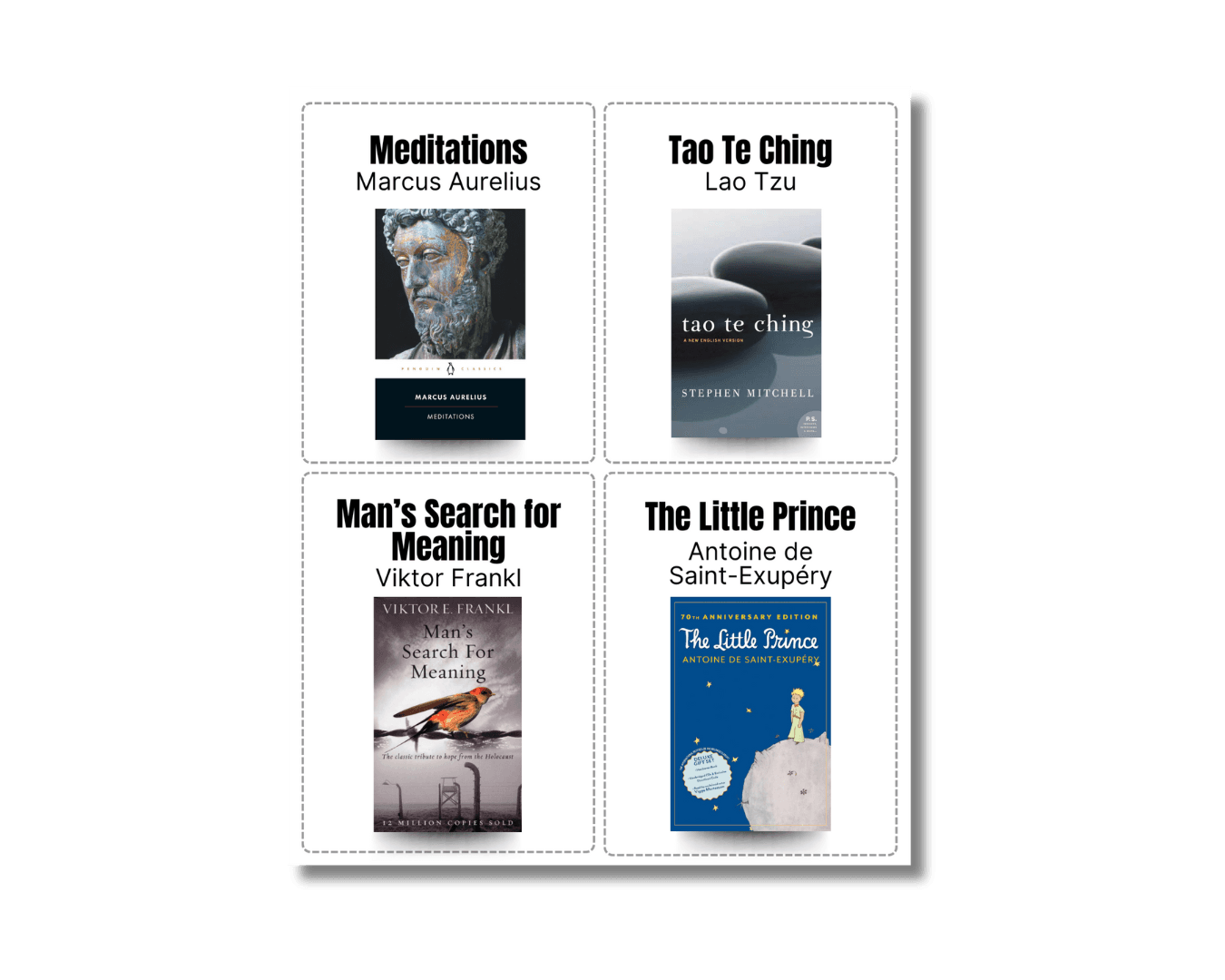Modern founders have endless input. And almost no time to process it.
The average day is packed with inputs—metrics, meetings, decisions, distractions. By the time night falls, your brain’s still running. So you scroll, stream, or click through just one more tab.
It’s not helping.
There’s a better way to end your day.
Slower, softer—and surprisingly clarifying.
Try a good book.
Not one about scaling. Or growth hacks. Or strategy frameworks. Instead, something that helps you unplug. Reset. And come back clearer the next day.
Here are four I recommend often.
This isn’t a typical leadership book for entrepreneurs. It’s the private journal of a Roman emperor.
He wrote it for himself—notes on courage, control, discipline, and death.
Centuries later, it’s still relevant.
Every page is short and reflective. You don’t need to read it in order. Just flip to any section and you’ll find something grounding. For stressed-out founders, this book helps reduce the noise.
Here’s my takeaway from this book:
- Control what you can. Drop what you can’t.
You can’t control the market, investor moods, or your competitor’s launch. But you can control how you show up every day—and that clarity is a leadership advantage. - Your ego will lie to you.
Just because you’re the founder doesn’t mean you’re always right. Marcus reminds you that unchecked ego is a fast path to poor decisions. - Adversity is fuel.
He faced plagues, wars, betrayal—and saw each one as a test of character. Your tough quarter? Same principle applies. - Death as a motivator.
“You could leave life right now.” It sounds heavy—but it sharpens your focus. Why waste time chasing things that don’t matter?
You’re reminded what actually matters—and what doesn’t.
This 2,500-year-old text is one of the most misunderstood but profound books for founders.
This isn’t a guidebook. It’s a series of poetic verses. Each one challenges how we think about power, action, and leadership.
It teaches that force isn’t always strength. That leading doesn’t always mean doing. This book is light to read, but heavy with insight.
Here’s my takeaway:
- Stillness can be strategic.
If your instinct is to jump into every fire, pause. The Tao teaches that not acting is sometimes the most powerful move. - Lead without forcing.
The best leadership doesn’t feel like control—it feels like space. Let your team grow without micromanagement. - Let go of the illusion of control.
You can architect systems, but you can’t predict how they’ll behave. Flow > force, especially in complex environments. - Clarity comes from quiet.
You won’t find your next big idea in your Asana backlog. Read a verse, sit with it, and feel your brain slow down.
Perfect for slowing your mind down before sleep.
One of the most powerful leadership books for entrepreneurs —especially those feeling stuck or burned out. Written by a psychiatrist who survived the Holocaust.
Frankl shares his experience in concentration camps—and how people found purpose, even in the darkest places.
It’s not an easy story. But it’s one of the most powerful books ever written. If you’re questioning the point of it all—this book brings a deep perspective.
Here’s my takeaway:
- Purpose turns pressure into resilience.
When founders connect their work to something larger than ARR, they lead from a deeper place. That’s where endurance comes from. - You always choose your response.
Investors bail, users churn, employees quit—it hurts. But your response? That’s yours alone, and Frankl says it’s where your power lies. - Suffering isn’t pointless—unless you let it be.
Founding is painful. But pain without reflection is just suffering. Tie it to growth, and it becomes meaning. - Zoom out. Then zoom back in.
If you’re obsessing over your next round or your churn rate, this book will shake you—hard—in a good way. The work matters, but how you carry it matters more.
This book helps you zoom out.
Not in a fluffy way. But in a lasting, serious way.
This book looks like a kids’ book, but it cuts deeper than most books for founders ever will.
A story about a pilot who meets a strange boy from another planet. Together, they explore love, loss, responsibility, and what it means to truly see.
Founders often operate at high speed. This book slows you down. Gently. It helps reconnect you to the emotional side of leadership—the part that’s human, curious, and kind.
Here’s my takeaway:
- Don’t lose your humanity in the hustle.
Founders often drift into purely strategic thinking. This book reminds you that emotion, care, and wonder belong in leadership too. - People > problems.
It’s easy to obsess over product-market fit and forget your team is made of people who want to be seen and valued. The Little Prince helps you remember. - Childlike perspective reveals real wisdom.
Founders get caught in adult logic—metrics, roadmaps, investor decks. Sometimes, clarity comes when you think like a child again. - Love is a responsibility.
The way you “tame” your team, your co-founder, your users—it’s a choice. This book gently asks: are you showing up with care?
You’ll finish it in an hour. But it’ll stay with you much longer.
Better Inputs, Better Outcomes
It’s not about the quantity of input, it’s about the quality of perspective.
A few pages of the right book can calm your nervous system—and sharpen your leadership the next day. So if you’re ending your day in a blur of tabs and timelines, maybe try something different.
Start with a book. Read a few pages. Then sleep.
Let the wisdom do its quiet work.
— Surabhi Shenoy


 BONUS: Read To Lead: 30 Books Every Founder Must Read.
BONUS: Read To Lead: 30 Books Every Founder Must Read.

